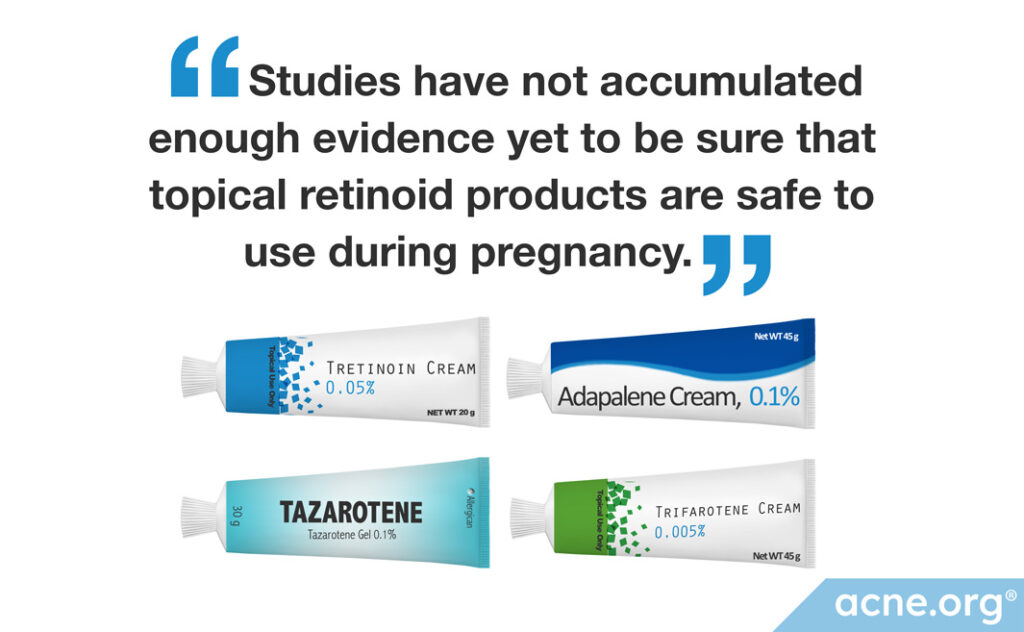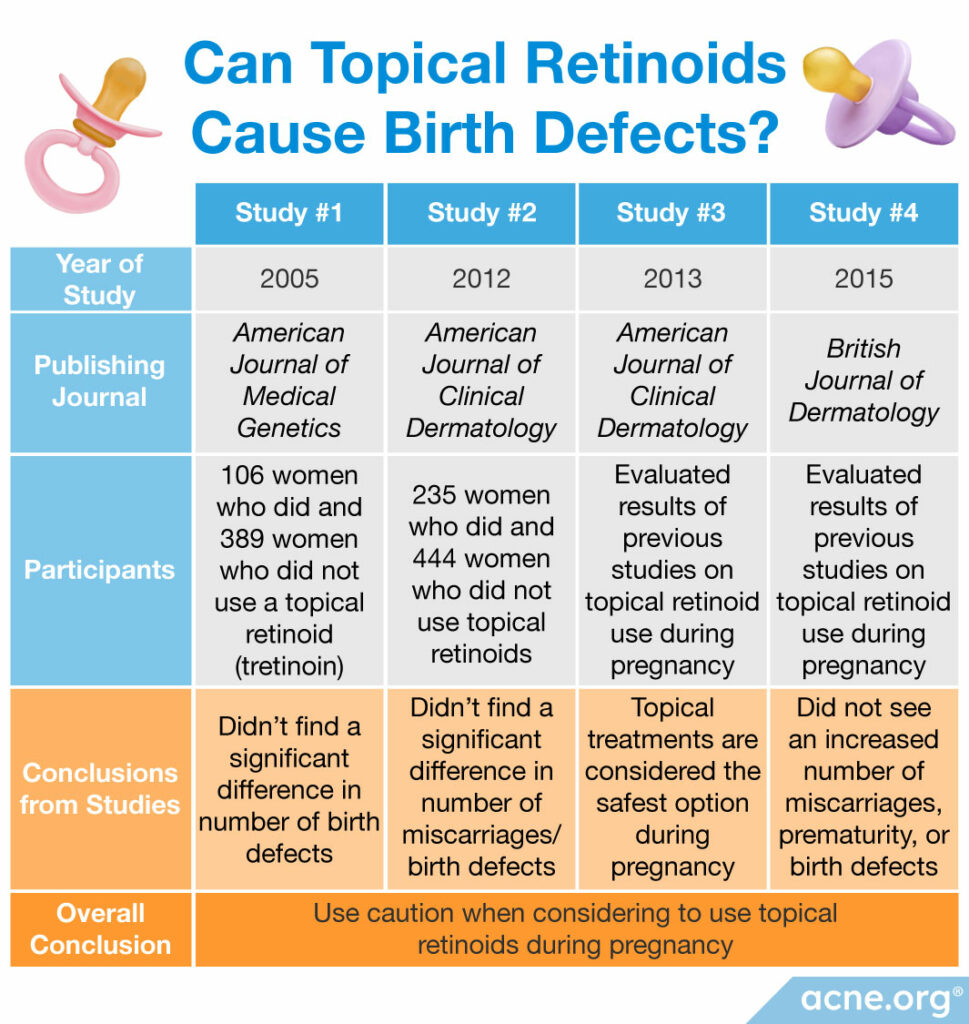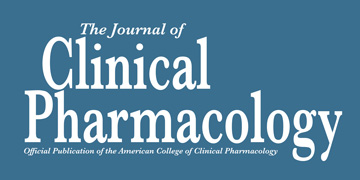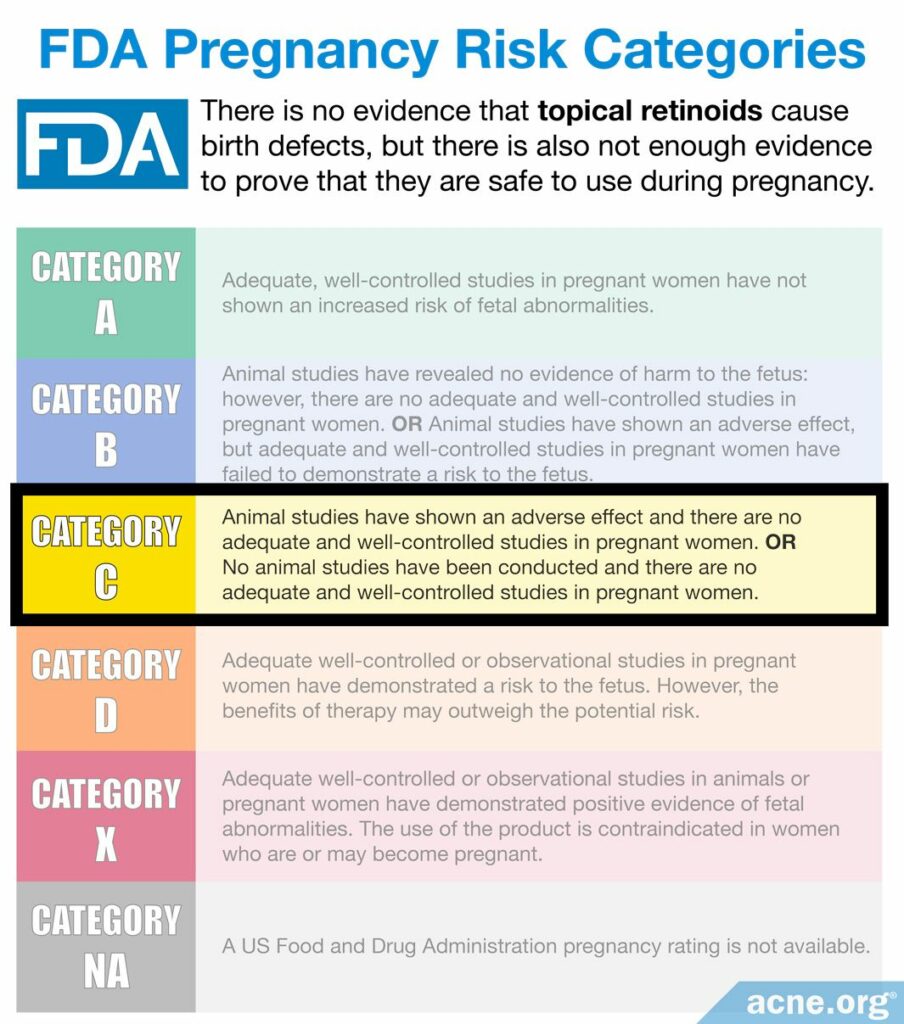Speak to Your Doctor Before Using Any Topical Retinoid Medication If You Are Pregnant or Trying to Conceive

The Essential Info
Doctors commonly prescribe topical retinoids (tretinoin, adapalene, tazarotene, trifarotene) to reduce acne. So far, there are not enough studies on topical retinoids to conclude that these products are safe to use during pregnancy. Women who are pregnant or planning to become pregnant should consult a physician before using a topical retinoid.
IMPORTANT: Women who are pregnant or planning to conceive should always speak to their doctor before using any medication, whether it be topical or oral.

The Science
- What Are Topical Retinoids?
- Can Topical Retinoids Cause Birth Defects?
- FDA Recommendation
- Recommendation by the European Medicines Agency
- The Bottom Line
Doctors commonly prescribe one of the 4 available topical retinoid medications–tretinoin, adapalene, tazarotene, or trifarotene–to patients with acne. So far, there are not enough studies on any of these to conclude that they are safe to use during pregnancy, which is why it is important for any woman who is pregnant or trying to conceive to speak to her physician before using topical retinoids.
What Are Topical Retinoids?

Retinoids are derivatives of Vitamin A that are important for proper vision and skin health.1,2 They are found in carrots, sweet potatoes, squash, and other vegetables and fruits that are red or orange. The pharmaceutical industry found that synthetically producing certain retinoids and applying them topically can also help to treat and prevent acne, and retinoids are now found in 4 prescription acne treatments–tretinoin, adapalene, tazarotene, and trifarotene.1-3
Oral Retinoids Cause Birth Defects, But What About Topical Retinoids?
The acne medication isotretinoin (Accutane®) is also a retinoid, but it is taken orally in pill form. It is well established that taking isotretinoin while pregnant drastically increases the risk of having a miscarriage, and directly causes devastating birth defects, including physical deformities, heart problems, and/or mental impairment.4
So does this mean topical retinoids are equally dangerous? No. Topical retinoids are safer to use during pregnancy than oral isotretinoin because absorption into the bloodstream through the skin is usually low.5 However, studies have not accumulated enough evidence yet to be sure that topical retinoid products are safe to use during pregnancy. This is partly due to the fact that it is ethically and legally complicated to study the effects of drugs on pregnant women.
Although a few case reports in the 1990s described birth defects after topical retinoid use, more recent studies have found no such risk.6 Four recent studies have taken a look at the safety of topical retinoid use during pregnancy, and while the preponderance of data does not support a link between topical retinoids and birth defects, there were not enough participants in the studies and the evidence that came from the studies is not compelling enough to conclude that topical retinoids are in fact safe during pregnancy. Therefore, all of the researchers who conducted these studies agree that they cannot recommend topical retinoids to pregnant women.4,5,7,8

Expand to read details of studies

In a 2005 study, researchers compared 106 women who used topical tretinoin cream during the first trimester of pregnancy to 389 women who did not use any of the topical retinoids in the first trimester. They found no differences between the 2 groups in the occurrence of minor or major birth defects.
However, the researchers noted that more data from large clinical studies is necessary to confirm that it is safe to use tretinoin during pregnancy.
The study was published in the American Journal of Medical Genetics.7

In a 2012 study, researchers compared 235 women who used topical retinoids during the first trimester of pregnancy to 444 women who did not use topical retinoids during the first trimester. They found that the two groups didn’t have a significant difference in the number of miscarriages or birth defects.
Although the researchers found no evidence that topical retinoids caused miscarriage or birth defects, they warned that the possible risk of using these products outweighed the benefits. They concluded, “according to current knowledge, topical retinoids cannot be advised for use during pregnancy because their risk/benefit ratio remains questionable.”4
This study was published in the Journal of Clinical Pharmacology.4

In a 2013 study, researchers evaluated the results of previous studies on topical retinoid use during pregnancy, including the 2012 study mentioned above. The researchers noted, “Topical treatments are considered the safest option during pregnancy.” But they also cautioned the use of topical retinoids because of four known cases of birth defects in women who were using topical retinoids while pregnant. They added, “There have been some case reports of birth defects in babies who had prenatal exposure to topical retinoids. There have been four case reports of congenital birth defects after the use of topical tretinoin in early pregnancy.”5
They concluded, “A formal consensus on the safety of topical retinoids in pregnancy is lacking and because the manufacturers advise that they should not be used during pregnancy, this treatment cannot be recommended at present.”5
This study was published in the American Journal of Clinical Dermatology.5

In a 2015 study, another group of researchers also evaluated the results of prior studies on topical retinoid use during pregnancy. From all the studies combined, a total of 654 pregnant women who used topical retinoids was compared to a total of 1,375 pregnant women who did not use topical retinoids. Again, they did not see an increased number of miscarriages, prematurity, or birth defects in those women who used topical retinoids during pregnancy.
In conclusion, the researchers noted, “This result may be used primarily in reassuring women who were inadvertently exposed to topical retinoids during their pregnancy.” But they also cautioned that the studies are “not adequate to justify the use of topical retinoids during pregnancy” because birth defects are rare, and so far the studies only include a small sample size of pregnant women.8
This study was published in the British Journal of Dermatology.8
FDA Recommendation
The U.S. Food and Drug Administration (FDA) classifies the topical retinoids tretinoin, adapalene, and tazarotene as Pregnancy Category C drugs. This means that there is no evidence that they cause birth defects, but there is also not enough evidence to prove that they are safe to use during pregnancy.9 The FDA has not yet assigned a Pregnancy Category for trifarotene because it only recently appeared on the market.

Recommendation by the European Medicines Agency
The European Medicines Agency gives the same recommendations as the FDA. Its guidelines state that the absorption of topical retinoids into the blood is negligible and that these medications are unlikely to harm a fetus. However, as a precaution, pregnant women and women who are planning to become pregnant should avoid topical retinoids.10
The Bottom Line
If you are pregnant, or plan to become pregnant, speak with your doctor before using a topical retinoid. In fact, it is important to speak to your doctor before you use any oral or topical medication, even if they are over-the-counter. Don’t take chances, check with your physician.
References
- Chivot, M. Retinoid therapy for acne. Am. J. Clin. Dermatol. 6, 13 – 19 (2005). https://www.ncbi.nlm.nih.gov/pubmed/15675886
- Sorg, O. & Saurat, J. H. Topical retinoids in skin aging: A focused update with reference to sun-induced epidermal vitamin a deficiency. Dermatology 228, 314 – 325 (2014). https://www.ncbi.nlm.nih.gov/pubmed/24821234
- Costa, C. S. & Bagatin, E. Evidence on acne therapy. Sao Paulo Med. J. 18, 193 – 197 (2013). https://www.ncbi.nlm.nih.gov/pubmed/23903269
- Panchaud, A. et al. Pregnancy outcome following exposure to topical retinoids: A multicenter prospective study. J. Clin. Pharmacol. 52, 1844 – 1851 (2012). https://www.ncbi.nlm.nih.gov/pubmed/22174426
- Meredith, F. M. & Ormerod, A. D. The management of acne vulgaris in pregnancy. Am. J. Clin. Dermatol. 14, 351 – 358 (2013). https://www.ncbi.nlm.nih.gov/pubmed/23996075
- Awan, S. Z & Lu, J. Management of severe acne during pregnancy: A case report and review of the literature. Int. J. Womens Dermatol. 3, 145-150 (2017). https://www.ncbi.nlm.nih.gov/pubmed/28831424
- Loureiro, K. D. et al. Minor malformations characteristic of the retinoic acid embryopathy and other birth outcomes in children of women exposed to topical tretinoin during early pregnancy. Am. J. Med. Genet. A 136, 117-121 (2005). https://pubmed.ncbi.nlm.nih.gov/15940677/
- Kaplan, Y. C. et al. Pregnancy outcomes following first-trimester exposure to topical retinoids: A systematic review and meta-analysis. Br. J. Dermatol. 173, 1132 – 1141 (2015). https://www.ncbi.nlm.nih.gov/pubmed/26215715
- Akhavan, A. & Bershad, S. Topical acne drugs: Review of clinical properties, systemic exposure, and safety. Am. J. Clin. Dermatol. 4, 473 – 492 (2003). https://www.ncbi.nlm.nih.gov/pubmed/12814337
- European Medicines Agency. Updated measures for pregnancy prevention during retinoid use (2018). Available from: https://www.ema.europa.eu/en/news/updated-measures-pregnancy-prevention-during-retinoid-use
 Acne.org Products
Acne.org Products